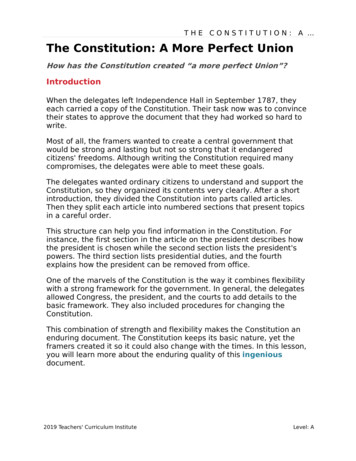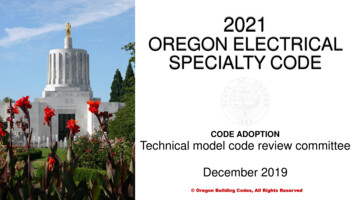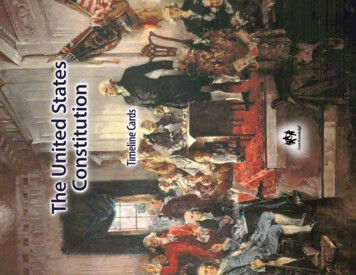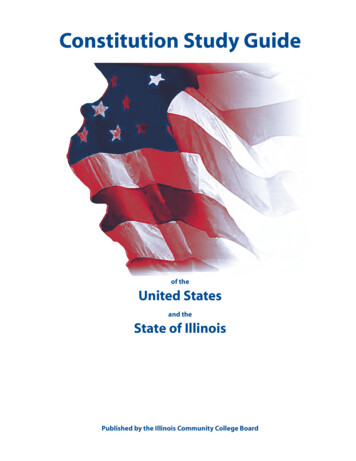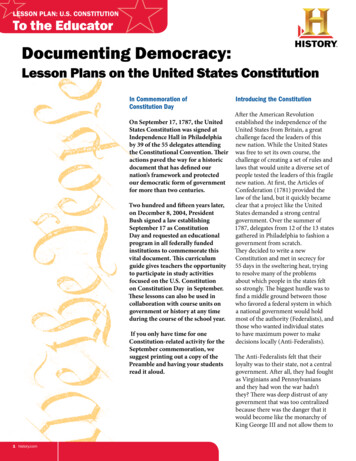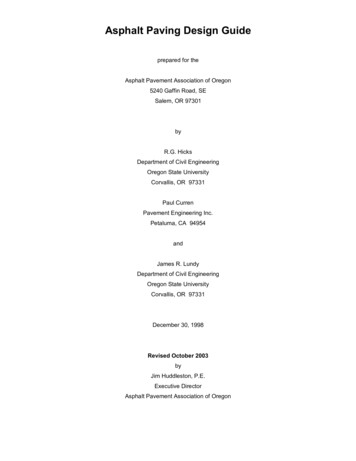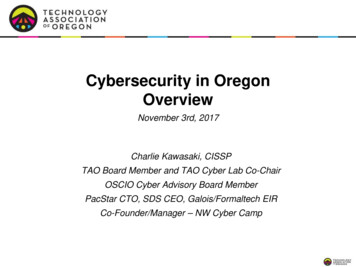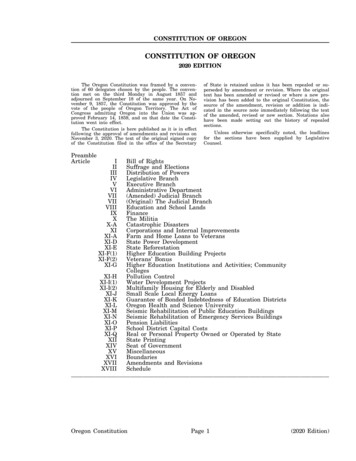
Transcription
CONSTITUTION OF OREGONCONSTITUTION OF OREGON2020 EDITIONThe Oregon Constitution was framed by a convention of 60 delegates chosen by the people. The convention met on the third Monday in August 1857 andadjourned on September 18 of the same year. On November 9, 1857, the Constitution was approved by thevote of the people of Oregon Territory. The Act ofCongress admitting Oregon into the Union was approved February 14, 1859, and on that date the Constitution went into effect.The Constitution is here published as it is in effectfollowing the approval of amendments and revisions onNovember 3, 2020. The text of the original signed copyof the Constitution filed in the office of the SecretaryPreambleArticleof State is retained unless it has been repealed or superseded by amendment or revision. Where the originaltext has been amended or revised or where a new provision has been added to the original Constitution, thesource of the amendment, revision or addition is indicated in the source note immediately following the textof the amended, revised or new section. Notations alsohave been made setting out the history of repealedsections.Unless otherwise specifically noted, the leadlinesfor the sections have been supplied by -AXI-DXI-EXI-F(1)XI-F(2)XI-GBill of RightsSuffrage and ElectionsDistribution of PowersLegislative BranchExecutive BranchAdministrative Department(Amended) Judicial Branch(Original) The Judicial BranchEducation and School LandsFinanceThe MilitiaCatastrophic DisastersCorporations and Internal ImprovementsFarm and Home Loans to VeteransState Power DevelopmentState ReforestationHigher Education Building ProjectsVeterans’ BonusHigher Education Institutions and Activities; CommunityCollegesXI-HPollution ControlXI-I(1)Water Development ProjectsXI-I(2)Multifamily Housing for Elderly and DisabledXI-JSmall Scale Local Energy LoansXI-KGuarantee of Bonded Indebtedness of Education DistrictsXI-LOregon Health and Science UniversityXI-MSeismic Rehabilitation of Public Education BuildingsXI-NSeismic Rehabilitation of Emergency Services BuildingsXI-OPension LiabilitiesXI-PSchool District Capital CostsXI-QReal or Personal Property Owned or Operated by StateXIIState PrintingXIVSeat of ts and RevisionsXVIIIScheduleOregon ConstitutionPage 1(2020 Edition)
CONSTITUTION OF OREGONPREAMBLEWe the people of the State of Oregon to the end that Justice be established, order maintained, and liberty perpetuated, do ordain this Constitution. —Oregon ConstitutionPage 2(2020 Edition)
CONSTITUTION OF OREGONARTICLE IBILL OF RIGHTSSec. 2.43.44.45.46.Natural rights inherent in peopleFreedom of worshipFreedom of religious opinionNo religious qualification for officeNo money to be appropriated for religionNo religious test for witnesses or jurorsManner of administering oath or affirmationFreedom of speech and pressUnreasonable searches or seizuresAdministration of justiceRights of Accused in Criminal ionTreatment of arrested or confined personsBailable offensesFoundation principles of criminal lawExcessive bail and fines; cruel and unusualpunishments; power of jury in criminal caseJury trial in civil casesPrivate property or services taken for publicuseImprisonment for debtEquality of privileges and immunities of citizensEx-post facto laws; laws impairing contracts;laws depending on authorization in order totake effect; laws submitted to electorsSuspension of operation of lawsHabeas corpusTreasonCorruption of blood or forfeiture of estateAssemblages of people; instruction of representatives; application to legislatureRight to bear arms; military subordinate tocivil powerQuartering soldiersTitles of nobility; hereditary distinctionsEmigrationTaxes and duties; uniformity of taxationEnumeration of rights not exclusiveSlavery or involuntary servitudeSale of liquor by individual glassPenalty for aggravated murderWork and training for corrections institutioninmates; work programs; limitations; dutiesof corrections directorRights of victim in criminal prosecutions andjuvenile court delinquency proceedingsRights of victim and public to protectionfrom accused person during criminal proceedings; denial of pretrial releaseTerm of imprisonment imposed by court tobe fully served; exceptionsPerson convicted of certain crimes not eligible to serve as juror on grand jury or trialjury in criminal caseProhibition on denial or abridgment of rightson account of sexSection 1. Natural rights inherent inpeople. We declare that all men, when theyform a social compact are equal in right: thatall power is inherent in the people, and allfree governments are founded on their authority, and instituted for their peace, safety,and happiness; and they have at all times aright to alter, reform, or abolish the government in such manner as they may thinkproper. —Oregon ConstitutionArt. I§11Section 2. Freedom of worship. Allmen shall be secure in the Natural right, toworship Almighty God according to the dictates of their own consciences. —Section 3. Freedom of religious opinion. No law shall in any case whatever control the free exercise, and enjoyment ofreligeous [sic] opinions, or interfere with therights of conscience. —Section 4. No religious qualificationfor office. No religious test shall be requiredas a qualification for any office of trust orprofit. —Section 5. No money to be appropriated for religion. No money shall be drawnfrom the Treasury for the benefit of anyreligeous [sic], or theological institution, norshall any money be appropriated for the payment of any religeous [sic] services in eitherhouse of the Legislative Assembly. —Section 6. No religious test for witnesses or jurors. No person shall be rendered incompetent as a witness, or juror inconsequence of his opinions on matters ofreligeon [sic]; nor be questioned in any Courtof Justice touching his religeous [sic] beliefto affect the weight of his testimony. —Section 7. Manner of administeringoath or affirmation. The mode of administering an oath, or affirmation shall be suchas may be most consistent with, and bindingupon the conscience of the person to whomsuch oath or affirmation may be administered. —Section 8. Freedom of speech andpress. No law shall be passed restraining thefree expression of opinion, or restricting theright to speak, write, or print freely on anysubject whatever; but every person shall beresponsible for the abuse of this right. —Section 9. Unreasonable searches orseizures. No law shall violate the right ofthe people to be secure in their persons,houses, papers, and effects, against unreasonable search, or seizure; and no warrantshall issue but upon probable cause, supported by oath, or affirmation, and particularly describing the place to be searched,and the person or thing to be seized. —Section 10. Administration of justice.No court shall be secret, but justice shall beadministered, openly and without purchase,completely and without delay, and every manshall have remedy by due course of law forinjury done him in his person, property, orreputation. —Section 11. Rights of Accused inCriminal Prosecution. In all criminal prosecutions, the accused shall have the right topublic trial by an impartial jury in thePage 3(2020 Edition)
Art. I§12CONSTITUTION OF OREGONcounty in which the offense shall have beencommitted; to be heard by himself and counsel; to demand the nature and cause of theaccusation against him, and to have a copythereof; to meet the witnesses face to face,and to have compulsory process for obtainingwitnesses in his favor; provided, however,that any accused person, in other than capital cases, and with the consent of the trialjudge, may elect to waive trial by jury andconsent to be tried by the judge of the courtalone, such election to be in writing; provided, however, that in the circuit court tenmembers of the jury may render a verdict ofguilty or not guilty, save and except a verdict of guilty of first degree murder, whichshall be found only by a unanimous verdict,and not otherwise; provided further, that theexisting laws and constitutional provisionsrelative to criminal prosecutions shall becontinued and remain in effect as to allprosecutions for crimes committed before thetaking effect of this amendment. [Constitutionof 1859; Amendment proposed by S.J.R. 4, 1931, andadopted by the people Nov. 8, 1932; Amendment proposed by S.J.R. 4, 1933 (2d s.s.), and adopted by thepeople May 18, 1934]Note: The leadline to section 11 was a part of themeasure submitted to the people by S.J.R. 4, 1931.Section 12. Double jeopardy; compulsory self-incrimination. No person shall beput in jeopardy twice for the same offence[sic], nor be compelled in any criminal prosecution to testify against himself. —Section 13. Treatment of arrested orconfined persons. No person arrested, orconfined in jail, shall be treated with unnecessary rigor. —Section 14. Bailable offenses. Offences[sic], except murder, and treason, shall bebailable by sufficient sureties. Murder ortreason, shall not be bailable, when the proofis evident, or the presumption strong. —Section 15. Foundation principles ofcriminal law. Laws for the punishment ofcrime shall be founded on these principles:protection of society, personal responsibility,accountability for one’s actions and reformation. [Constitution of 1859; Amendment proposed byS.J.R. 32, 1995, and adopted by the people Nov. 5, 1996]Section 16. Excessive bail and fines;cruel and unusual punishments; power ofjury in criminal case. Excessive bail shallnot be required, nor excessive fines imposed.Cruel and unusual punishments shall not beinflicted, but all penalties shall be proportioned to the offense.—In all criminal caseswhatever, the jury shall have the right todetermine the law, and the facts under thedirection of the Court as to the law, and theright of new trial, as in civil cases.Oregon ConstitutionSection 17. Jury trial in civil cases. Inall civil cases the right of Trial by Jury shallremain inviolate. —Section 18. Private property or services taken for public use. Private propertyshall not be taken for public use, nor theparticular services of any man be demanded,without just compensation; nor except in thecase of the state, without such compensationfirst assessed and tendered; provided, thatthe use of all roads, ways and waterwaysnecessary to promote the transportation ofthe raw products of mine or farm or forestor water for beneficial use or drainage isnecessary to the development and welfare ofthe state and is declared a public use.[Constitution of 1859; Amendment proposed by S.J.R. 17,1919, and adopted by the people May 21, 1920; Amendment proposed by S.J.R. 8, 1923, and adopted by thepeople Nov. 4, 1924]Section 19. Imprisonment for debt.There shall be no imprisonment for debt, except in case of fraud or abscondingdebtors. —Section 20. Equality of privileges andimmunities of citizens. No law shall bepassed granting to any citizen or class ofcitizens privileges, or immunities, which,upon the same terms, shall not equally belong to all citizens. —Section 21. Ex-post facto laws; lawsimpairing contracts; laws depending onauthorization in order to take effect;laws submitted to electors. No ex-postfacto law, or law impairing the obligation ofcontracts shall ever be passed, nor shall anylaw be passed, the taking effect of whichshall be made to depend upon any authority,except as provided in this Constitution; provided, that laws locating the Capitol of theState, locating County Seats, and submittingtown, and corporate acts, and other local,and Special laws may take effect, or not,upon a vote of the electors interested. —Section 22. Suspension of operationof laws. The operation of the laws shallnever be suspended, except by the Authorityof the Legislative Assembly.Section 23. Habeas corpus. The privilege of the writ of habeas corpus shall notbe suspended unless in case of rebellion, orinvasion the public safety require it. —Section 24. Treason. Treason againstthe State shall consist only in levying waragainst it, or adhering to its enemies, givingthem aid or comfort.—No person shall beconvicted of treason unless on the testimonyof two witnesses to the same overt act, orconfession in open Court. —Page 4(2020 Edition)
CONSTITUTION OF OREGONSection 25. Corruption of blood orforfeiture of estate. No conviction shallwork corruption of blood, or forfeiture of estate. —Section 26. Assemblages of people; instruction of representatives; applicationto legislature. No law shall be passed restraining any of the inhabitants of the Statefrom assembling together in a peaceablemanner to consult for their common good;nor from instructing their Representatives;nor from applying to the Legislature for redress of greviances [sic]. —Section 27. Right to bear arms; military subordinate to civil power. The people shall have the right to bear arms for thedefence [sic] of themselves, and the State,but the Military shall be kept in strict subordination to the civil power[.]Section 28. Quartering soldiers. Nosoldier shall, in time of peace, be quarteredin any house, without the consent of theowner, nor in time of war, except in themanner prescribed by law.Section 29. Titles of nobility; hereditary distinctions. No law shall be passedgranting any title of Nobility, or conferringhereditary distinctions. —Section 30. Emigration. No law shallbe passed prohibiting emigration from theState. —Section 31. Rights of aliens; immigration tostate. [Constitution of 1859; repeal proposed by H.J.R.16, 1969, and adopted by the people May 26, 1970]Section 32. Taxes and duties; uniformity of taxation. No tax or duty shallbe imposed without the consent of the peopleor their representatives in the LegislativeAssembly; and all taxation shall be uniformon the same class of subjects within the territorial limits of the authority levying thetax. [Constitution of 1859; Amendment proposed byH.J.R. 16, 1917, and adopted by the people June 4, 1917]Section 33. Enumeration of rights notexclusive. This enumeration of rights, andprivileges shall not be construed to impairor deny others retained by the people. —Section 34. Slavery or involuntaryservitude. There shall be neither slavery,nor involuntary servitude in the State, otherwise than as a punishment for crime,whereof the party shall have been duly convicted. — [Added to Bill of Rights as unnumberedsection by vote of the people at time of adoption of theOregon Constitution in accordance with section 4 ofArticle XVIII thereof]Section 35. Restrictions on rights of certainpersons. [Added to Bill of Rights as unnumbered section by vote of the people at time of adoption of theOregon Constitution in accordance with Section 4 ofArticle XVIII thereof; Repeal proposed by H.J.R. 8, 1925,and adopted by the people Nov. 2, 1926]Oregon ConstitutionArt. I§39Section 36. Liquor prohibition. [Created throughinitiative petition filed July 1, 1914, and adopted by thepeople Nov. 3, 1914; Repeal proposed by initiative petition filed March 20, 1933, and adopted by the peopleJuly 21, 1933]Section 36. Capital punishment abolished.[Created through initiative petition filed July 2, 1914,and adopted by the people Nov. 3, 1914; Repeal proposedby S.J.R. 8, 1920 (s.s.), and adopted by the people May21, 1920, as Const. Art. I, §38]Note: At the general election in 1914 two sections,each designated as section 36, were created and addedto the Constitution by separate initiative petitions. Oneof these sections was the prohibition section and theother abolished capital punishment.Section 36a. Prohibition of importation of liquors. [Created through initiative petition filed July 6,1916, and adopted by the people Nov. 7, 1916; Repealproposed by initiative petition filed March 20, 1933, andadopted by the people July 21, 1933]Section 37. Penalty for murder in first degree.[Created through S.J.R. 8, 1920, and adopted by thepeople May 21, 1920; Repeal proposed by S.J.R. 3, 1963,and adopted by the people Nov. 3, 1964]Section 38. Laws abrogated by amendmentabolishing death penalty revived. [Created throughS.J.R. 8, 1920, and adopted by the people May 21, 1920;Repeal proposed by S.J.R. 3, 1963, and adopted by thepeople Nov. 3, 1964]Section 39. Sale of liquor by individualglass. The State shall have power to s’ organizations, railroad corporationsoperating interstate trains and commercialestablishments where food is cooked andserved, for the purpose of selling alcoholicliquor by the individual glass at retail, forconsumption on the premises, includingmixed drinks and cocktails, compounded ormixed on the premises only. The LegislativeAssembly shall provide in such detail as itshall deem advisable for carrying out andadministering the provisions of this amendment and shall provide adequate safeguardsto carry out the original intent and purposeof the Oregon Liquor Control Act, includingthe promotion of temperance in the use andconsumption of alcoholic beverages, encourage the use and consumption of lighter beverages and aid in the establishment ofOregon industry. This power is subject to thefollowing:(1) The provisions of this amendmentshall take effect and be in operation sixty(60) days after the approval and adoption bythe people of Oregon; provided, however, theright of a local option election exists in thecounties and in any incorporated city ortown containing a population of at least fivehundred (500). The Legislative Assemblyshall prescribe a means and a procedure bywhich the voters of any county or incorporated city or town as limited above in anycounty, may through a local option electiondetermine whether to prohibit or permit suchpower, and such procedure shall specificallyPage 5(2020 Edition)
Art. I§40CONSTITUTION OF OREGONinclude that whenever fifteen per cent (15%)of the registered voters of any county in thestate or of any incorporated city or town aslimited above, in any county in the state,shall file a petition requesting an election inthis matter, the question shall be voted uponat the next regular November biennialelection, provided said petition is filed notless than sixty (60) days before the day ofelection.(2) Legislation relating to this mattershall operate uniformly throughout the stateand all individuals shall be treated equally;and all provisions shall be liberally construedfor the accomplishment of these purposes.[Created through initiative petition filed July 2, 1952,and adopted by the people Nov. 4, 1952]Section 40. Penalty for aggravatedmurder. Notwithstanding sections 15 and 16of this Article, the penalty for aggravatedmurder as defined by law shall be death uponunanimous affirmative jury findings as provided by law and otherwise shall be life imprisonment with minimum sentence asprovided by law. [Created through initiative petition filed July 6, 1983, and adopted by the people Nov.6, 1984]Section 41. Work and training forcorrections institution inmates; workprograms; limitations; duties of corrections director. (1) Whereas the people of thestate of Oregon find and declare that inmateswho are confined in corrections institutionsshould work as hard as the taxpayers whoprovide for their upkeep; and whereas thepeople also find and declare that inmatesconfined within corrections institutions mustbe fully engaged in productive activity ifthey are to successfully re-enter society withpractical skills and a viable work ethic; now,therefore, the people declare:(2) All inmates of state corrections institutions shall be actively engaged full-time inwork or on-the-job training. The work or onthe-job training programs shall be establishedand overseen by the corrections director,who shall ensure that such programs arecost-effective and are designed to develop inmate motivation, work capabilities and cooperation. Such programs may include bootcamp prison programs. Education may beprovided to inmates as part of work or onthe-job training so long as each inmate isengaged at least half-time in hands-on training or work activity.(3) Each inmate shall begin full-timework or on-the-job training immediately uponadmission to a corrections institution, allowing for a short time for administrative intakeand processing. The specific quantity ofhours per day to be spent in work or on-thejob training shall be determined by the corOregon Constitutionrections director, but the overall time spentin work or training shall be full-time. However, no inmate has a legally enforceableright to a job or to otherwise participate inwork, on-the-job training or educational programs or to compensation for work or laborperformed while an inmate of any state,county or city corrections facility or institution. The corrections director may reduce orexempt participation in work or trainingprograms by those inmates deemed by corrections officials as physically or mentallydisabled, or as too dangerous to society toengage in such programs.(4) There shall be sufficient work andtraining programs to ensure that every eligible inmate is productively involved in one ormore programs. Where an inmate is drug andalcohol addicted so as to prevent the inmatefrom effectively participating in work ortraining programs, corrections officials shallprovide appropriate drug or alcohol treatment.(5) The intent of the people is thattaxpayer-supported institutions and programsshall be free to benefit from inmate work.Prison work programs shall be designed andcarried out so as to achieve savings in government operations, so as to achieve a netprofit in private sector activities or so as tobenefit the community.(6) The provisions of this section aremandatory for all state corrections institutions. The provisions of this section arepermissive for county or city corrections facilities. No law, ordinance or charter shallprevent or restrict a county or city governing body from implementing all or part of theprovisions of this section. Compensation, ifany, shall be determined and established bythe governing body of the county or citywhich chooses to engage in prison work programs, and the governing body may chooseto adopt any power or exemption allowed inthis section.(7) The corrections director shall contactpublic and private enterprises in this stateand seek proposals to use inmate work. Thecorrections director may: (a) install andequip plants in any state corrections institution, or any other location, for the employment or training of any of the inmatestherein; or (b) purchase, acquire, install,maintain and operate materials, machineryand appliances necessary to the conduct andoperation of such plants. The corrections director shall use every effort to enter intocontracts or agreements with private business concerns or government agencies to accomplish the production or marketing ofproducts or services produced or performedby inmates. The corrections director mayPage 6(2020 Edition)
CONSTITUTION OF OREGONcarry out the director’s powers and dutiesunder this section by delegation to others.(8) Compensation, if any, for inmates whoengage in prison work programs shall be determined and established by the correctionsdirector. Such compensation shall not besubject to existing public or private sectorminimum or prevailing wage laws, exceptwhere required to comply with federal law.Inmate compensation from enterprises entering into agreements with the state shall beexempt from unemployment compensationtaxes to the extent allowed under federallaw. Inmate injury or disease attributable toany inmate work shall be covered by a corrections system inmate injury fund ratherthan the workers compensation law. Exceptas otherwise required by federal law to permit transportation in interstate commerce ofgoods, wares or merchandise manufactured,produced or mined, wholly or in part by inmates or except as otherwise required bystate law, any compensation earned throughprison work programs shall only be used forthe following purposes: (a) reimbursement forall or a portion of the costs of the inmate’srehabilitation, housing, health care, and living costs; (b) restitution or compensation tothe victims of the particular inmate’s crime;(c) restitution or compensation to the victimsof crime generally through a fund designedfor that purpose; (d) financial support forimmediate family of the inmate outside thecorrections institution; and (e) payment offines, court costs, and applicable taxes.(9) All income generated from prisonwork programs shall be kept separate fromgeneral fund accounts and shall only be usedfor implementing, maintaining and developing prison work programs. Prison industrywork programs shall be exempt from statutory competitive bid and purchase requirements. Expenditures for prison workprograms shall be exempt from the legislativeappropriations process to the extent the programs rely on income sources other thanstate taxes and fees. Where state taxes orfees are the source of capital or operatingexpenditures, the appropriations shall bemade by the legislative assembly. The stateprograms shall be run in a businesslike fashion and shall be subject to regulation by thecorrections director. Expenditures from income generated by state prison work programs must be approved by the correctionsdirector. Agreements with private enterpriseas to state prison work programs must beapproved by the corrections director. Thecorrections director shall make all state records available for public scrutiny and therecords shall be subject to audit by the Secretary of State.Oregon ConstitutionArt. I§41(10) Prison work products or servicesshall be available to any public agency andto any private enterprise of any state, anynation or any American Indian or AlaskanNative tribe without restriction imposed byany state or local law, ordinance or regulation as to competition with other public orprivate sector enterprises. The products andservices of corrections work programs shallbe provided on such terms as are set by thecorrections director. To the extent determined possible by the corrections director,the corrections director shall avoid establishing or expanding for-profit prison workprograms that produce goods or services offered for sale in the private sector if the establishment or expansion would displace orsignificantly reduce preexisting private enterprise. To the extent determined possibleby the corrections director, the correctionsdirector shall avoid establishing or expandingprison work programs if the establishment orexpansion would displace or significantly reduce government or nonprofit programs thatemploy persons with developmental disabilities. However, the decision to establish,maintain, expand, reduce or terminate anyprison work program remains in the solediscretion of the corrections director.(11) Inmate work shall be used as muchas possible to help operate the correctionsinstitutions themselves, to support othergovernment operations and to support community charitable organizations. This workincludes, but is not limited to, institutionalfood production; maintenance and repair ofbuildings, grounds, and equipment; officesupport services, including printing; prisonclothing production and maintenance; prisonmedical services; training other inmates; agricultural and forestry work, especially inparks and public forest lands; and environmental clean-up projects. Every state agencyshall cooperate with the corrections directorin establishing inmate work programs.(12) As used throughout this section, unless the context requires otherwise: “fulltime” means the equivalent of at least fortyhours per seven day week, specifically including time spent by inmates as required bythe Department of Corrections, while the inmate is participating in work or on-the-jobtraining, to provide for the safety and security of the public, correctional staff and inmates; “corrections director” means theperson in charge of the state correctionssystem.(13) This section is self-implementing andsupersedes all existing inconsistent statutes.This section shall become effective April 1,1995. If any part of this section or its application to any person or circumstance is heldto be invalid for any reason, then the re-Page 7(2020 Edition)
Art. I§42CONSTITUTION OF OREGONmaining parts or applications to any personsor circumstances shall not be affected butshall remain in full force and effect. [Createdthrough initiative petition filed Jan. 12, 1994, andadopted by the people Nov. 8, 1994; Amendment proposed by H.J.R. 2, 1997, and adopted by the people May20, 1997; Amendment proposed by H.J.R. 82, 1999, andadopted by the people Nov. 2, 1999]Note: Added to Article I as unnumbered section byinitiative petition (Measure No. 17, 1994) adopted by thepeople Nov. 8, 1994.Note: An initiative petition (Measure No. 40, 1996)proposed adding a new section relating to crime victims’rights to the Oregon Constitution. That section, appearing as section 42 of Article I in previous editionsof this Constitution, was declared void for not beingenacted in compliance with section 1, Article XVII ofthis Constitution. See Armatta v. Kitzhaber, 327 Or. 250,959 P.2d 49 (1998).Section 42. Rights of victim in criminal prosecutions and juvenile court delinquency proceedings. (1) To preserve andprotect the right of crime victims to justice,to ensure crime victims a meaningful role inthe criminal and juvenile justice systems, toaccord crime victims due dignity and respectand to ensure that criminal and juvenilecourt delinquency proceedings are conductedto seek the truth as to the defendant’s innocence or guilt, and also to ensure that a fairbalance is struck between the rights of crimevictims and the rights of criminal defendantsin the course and conduct of criminal andjuvenile court delinquency proceedings, thefollowing rights are hereby grant
The Constitution is here published as it is in effect following the approval of amendments and revisions on November 3, 2020. The text of the original signed copy of the Constitution filed in the office of the Secretary of State is retained unless it has been repealed or
